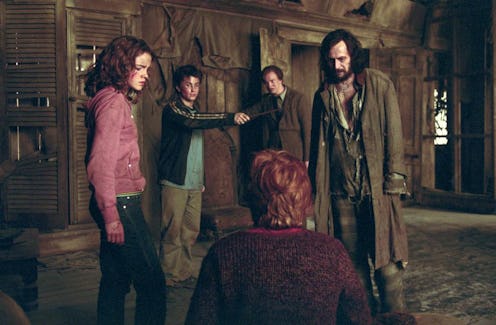Entertainment
The Enduring Glory Of 'Prisoner Of Azkaban'

In a different way entirely than the day little Harry Potter got his acceptance to Hogwarts School Of Witchcraft and Wizardry, Harry Potter and the Prisoner Of Azkaban was a game-changer. Though the book came out in July of 1999, June 4 marks the 10th anniversary of the U.S. release of Alfonso Cuaron's adaptation — so what better time than now to look back at everything that made Prisoner Of Azkaban a landmark storytelling event for an entire generation?
When I told one friend of today's special anniversary — a friend for whom, like many our age, Prisoner Of Azkaban was formative — her response was succinct but poetic: "I am ruined." That's because Prisoner Of Azkaban was the moment in history when the Harry Potter series deepened from a magical romp into the kind of mythos that could really take hold of an entire generation. And the movie, for its part, made its mark as the most unique of the bunch.
In terms of plot, Prisoner Of Azkaban is relatively sparse: There's a big third-act twist that leads into the climax of the fourth book's resurrection of Voldemort, but other than that PoA just wasn't very loud. And yet it resonated. The reason seems clear: PoA didn't defeat the dark lord, but it deepened the backstory. And it was home to some of the most crucial expanses of world-building and character-development in the entire series. It quickly became iconic.
When I walked out of the dusty Southern California movie theater where I first saw the movie, I was appalled. I was thirteen years old and not yet accustomed to movie adaptations taking their own spin on my favorite stories, and I was having none of it. That werewolf was all wrong! The gall of it!
Now, a decade later, Prisoner Of Azkaban — and almost everything Alfonso Cuaron did to twist it around — is one of my favorites of the Harry Potter movies. He made the world more colorful, and even where he deviates (I still know a few people peeved the kids got to wear muggle clothes) I'm grateful for it. Those shrunken heads and that werewolf design are still mystery decisions to me, but I've accepted them. He infused the world with new landscapes and energy, and it brought a life to the series that will never not be magical. In other words, it was a twist the Harry Potter world desperately needed.
The Harry Potter world as translated to screen was never not magical, and the world imagined by Chris Columbus across the first two films is in keeping with much of the energy of the first two books: It was a children's story. It was bright, and innocent, and beautiful and magical in just the way Harry saw it when he was freed from his abusive childhood. It was what it needed. But Prisoner Of Azkaban the book changed everything, so Prisoner Of Akzaban the movie responded in kind.
When you bring up PoA to Harry Potter fans, there's a small group of people who spring to the forefront of discussion almost immediately. That'd be the marauders, the band of mischief-makers that was comprised of Harry's father, James Potter, his godfather Sirius Black, his future teacher and constant tortured werewolf, Remus Lupin, and the ever-complicated and cowardly Peter Pettigrew. Expand your scope of marauders into talk of that entire generation and you've also got Harry's mother Lily Evans at the forefront, as well as another teacher, Severus Snape.
Their stories infuse every page of Prisoner Of Azkaban, and rightfully so: From the tricks, to the romance, to the war, to the endless subtext (allegorical, sexual, what have you), theirs are the ones that still have Harry Potter fans pining for a prequel series. (Or a BBC miniseries — anything! Just give us anything!). Whereas Harry, Ron, and Hermione will always live at the forefront of the legacy of Harry Potter, it's the marauder generation that defined their world, which in turn defined ours.
Here's a fun fact: Alfonso Cuaron directed David Thewlis (Remus) and Gary Oldman (Sirius) to play their characters as if they were gay junkies — perhaps inadvertently stumbling into one of the more ardent subsections of the Harry Potter fandom's id. And Prisoner Of Azkaban is, in many ways, the id of the Harry Potter books and movies. It's the X-Men, infused with allegory and subtext that's alternately sexual and political. It's the second season of Buffy the Vampire Slayer, diving deeper into the mythos and emotion and raw adolescence that makes itself and its main character tick. And for many in the Harry Potter generation, it's everything.
Image: Warner Bros.